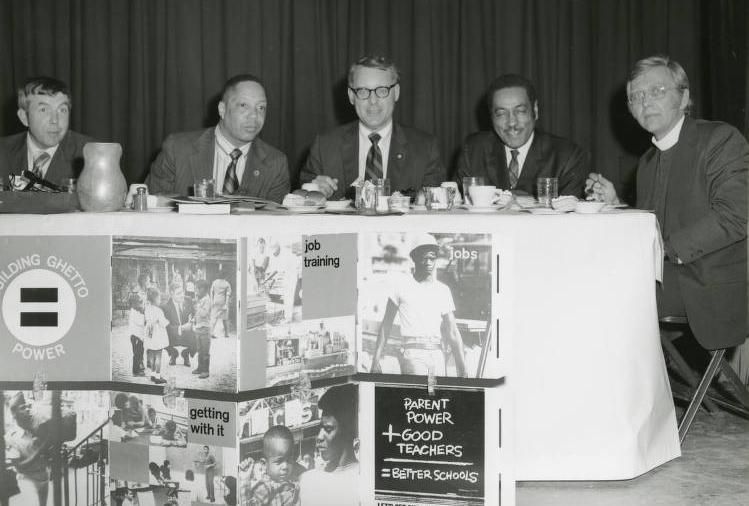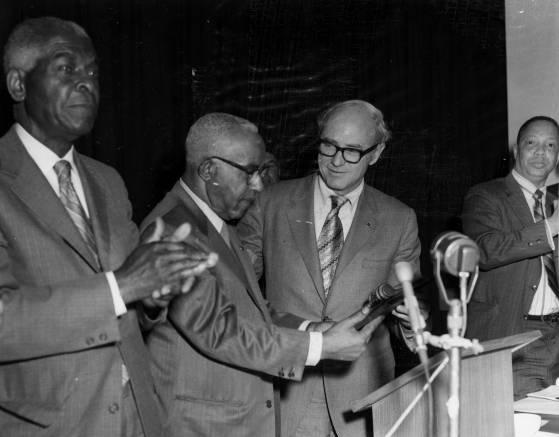Indianapolis Urban League (IUL) is a nonprofit, non-partisan, interracial, community-based social service civil rights organization affiliated with the National Urban League.
Incorporated in December 1965, the Indianapolis Urban League (IUL) succeeded the Association for Merit Employment, a local organization founded by the American Friends Service Committee in 1952 as a part of its Job Opportunity Program.

was hired as the organization’s first executive director (later president) in 1966. Born in Mississippi, Jones had previous Urban League experience and was committed to achieving equal access to education, employment, healthcare, and housing for all Indianapolis residents. IUL addressed these goals by enacting a variety of community-based initiatives over the years.
Since its beginning IUL has worked to ease racial tensions and promote further understanding between Blacks and whites. It provides services in the areas of health, welfare, economic development, housing, advocacy, and criminal justice; encourages minority businesses and nonpartisan participation in the political process; disseminates information about public policy issues; and provides services ranging from help with school problems to job counseling.
The Indianapolis Urban League’s programs have changed over the years in response to community needs. Early special programs continued from its predecessor organization addressed child abuse and neglect. The Human Relations Consortium (1964-1979) dealt with school desegregation and busing issues. Meanwhile, the Clearstream Garden Multi-Service and Youth Project (1964-1982) took social services to the residents of a public housing project and aided youths in finding summer employment.

New business development initiatives were introduced by the Urban League in the 1970s and 1980s. The Business Development Center provided loans for new and expanding businesses, sponsored management seminars for small businesses, and directed an MBA internship program. The Local Outreach Center also supported minority business enterprises.
In the 1990s, the Indianapolis Urban League had specific goals to help the Black community economically and socially. Project NEAT was designed to heighten citizens’ awareness of drug problems. Concerned Males of Indianapolis, meanwhile, provided mentors and role models for Black males.
By the start of the 21st century, the Indianapolis Urban League needed additional space to conduct its operations. The construction of IUL’s new headquarters was completed in 2001. Located on , this building is officially known as the Indianapolis Urban League—Sam H. Jones Center. A year after this facility opened, Jones retired from IUL after serving 36 years as president.
Joseph A Slash succeeded Jones. A former deputy mayor, Slash led the Indianapolis Urban League for 12 years (2002-2014). Since 2014, Anthony (Tony) Mason has served as IUL’s president.
The Indianapolis Urban League continues its mission of assisting African Americans, other minorities, and disadvantaged individuals in achieving social and economic equality. The organization has a five-point strategy designed to implement this mission: Education and Youth Empowerment, Economic Empowerment, Health and Quality of Life Empowerment, Civic Engagement and Leadership Empowerment, and Civil Rights and Racial Justice Empowerment.
The Indianapolis Urban League’s work is funded by the as well as various government bodies, individuals, organizations, and businesses. In August 2020, provided a $100 million grant to the National Urban League to create the Indianapolis African American Quality of Life initiative. The grant, intended to turn grassroots ideas into action, aims specifically to address challenges facing the city’s Black community.

Help improve this entry
Contribute information, offer corrections, suggest images.
You can also recommend new entries related to this topic.